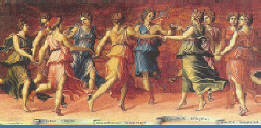|
|
Blake was born in London to a family of dissenting drapers and was educated privately.
He retained strong religious convictions throughout his life becoming an adherent of
freedom, equality and natural justice; and held strong spiritual beliefs throughout
his life.
His father encouraged his early talent for drawing and engraving and apprenticed him
to an engraver at age 14 years. Towards the end of his apprenticeship, he began studies
at the Royal Academy and exhibited there over several years despite his criticism of the
artistic views of the founding president, Joshua Reynolds.
He married the illiterate Catherine Boucher in 1782 but the marriage, after a still birth,
was not blessed with children and he may have been tempted to extramarital affairs then
advocated by several doctrines of the time. The marriage was a lasting success, however,
with both partners remaining devoted until their deaths.
William taught Catherine to read and write as well as some engraving skills; and she
remained instrumental as a helpmate throughout his life. He published Poetical Sketches
in 1783 and became partner from 1784 in an unsuccessful print shop venture for which he
made several engravings using the intaglio process but later often turned to the relief
etching process for his own works.
The couple moved to Felpham in 1800 in order for William to concentrate on engravings
and to write Milton: A Poet in which his best known poem, Jerusalem, appeared. Upon return
to London in 1804, he concentrated on poetry and engravings particularly of biblical subjects.
His works tend to express visionary and mystic views as well as his despair at
indifference to suffering; but interest after his death declined until the later
19th century when they were recognized as influential on later romanticism and thought.
|

